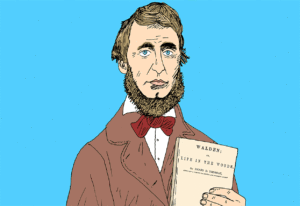Health, religion and animal rights have all been advanced as reasons not to eat meat.
The Wall Street Journal, October 18, 2019

ILLUSTRATION: PETER ARKLE
The claim that today’s ingeniously engineered fake meat tastes like the real thing and helps the planet is winning over consumers from the carnivore side of the food aisle. According to Barclays, the alt-meat market could be worth $140 billion a year a decade from now. But the argument over the merits of vegetarianism is nothing new; it’s been going on since ancient times.
Meat played a pivotal role in the evolution of the human brain, providing the necessary calories and protein to enable it to increase in size. Nonetheless, meat-eating remained a luxury in the diets of most early civilizations. It wasn’t much of a personal sacrifice, therefore, when the Greek philosopher Pythagoras (ca. 570-495 B.C.), author of the famous theorem, became what many consider the first vegetarian by choice. Pythogoreans believed that humans could be reincarnated as animals and vice versa, meaning that if you ate meat, Aunt Lydia could end up on your plate.
The anti-meat school of thought was joined a century later by Plato, who argued in the Republic that meat consumption encouraged decadence and warlike behavior. These views were strongly countered by Aristotelian philosophy, which taught that animals exist for human use—an opinion that the Romans heartily endorsed.
The avoidance of meat for moral and ascetic reasons also found a home in Buddhism and Hinduism. Ashoka the Great, the 3rd-century Buddhist emperor of the Maurya Dynasty of India, abolished animal sacrifice and urged his people to abstain from eating flesh.
It wasn’t until the Enlightenment, however, that Western moralists and philosophers began to argue for vegetarianism on the grounds that we have a moral duty to avoid causing animals pain. In 1641 the Massachusetts Bay Colony passed one of the earliest laws against animal cruelty. By the early 19th century, the idea that animals have rights had started to take hold: The English Romantic poet Percy Bysshe Shelley proselytized for vegetarianism, as did the American transcendentalist thinker Henry David Thoreau, who wrote in “Walden”: “I have no doubt that it is part of the destiny of the human race … to leave off eating animals.”
The word “vegetarian” first appeared in print in England in 1842. Within a decade there were vegetarian societies in Britain and America. Echoing the Platonists rather than Pythagoras, their guiding motivation was self-denial as opposed to animal welfare. Sylvester Graham, the leader of the early American vegetarian movement, also urged sexual abstinence on his followers.
Vegetarianism finally escaped its moralistic straitjacket at the end of the 19th century, when the health guru John Harvey Kellogg, the inventor of corn flakes, popularized meat-free living for reasons of bodily well-being at his Battle Creek Sanitarium in Michigan.
There continue to be mixed motivations for vegetarianism today. Burger King’s meatless Impossible Whopper may be “green,” but it has less protein and virtually the same number of calories as the original. A healthier version will no doubt appear before long, and some people hope that when lab-grown meat hits the market in a few years, it will be as animal- and climate-friendly as plant-based food. With a lot of science and a bit of luck, vegetarians and meat-eaters may end up in the same place.





